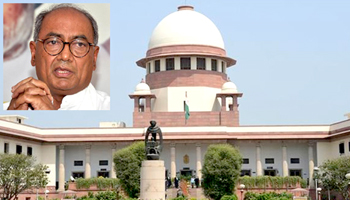New Delhi/Bhopal, Jul 9: As the mysterious Vyapam scam is getting murkier with each passing day, the Supreme Court on Thursday will hear a plea of Congress leader Digvijay Singh and three whistle-blower's seeking an apex court-monitored CBI probe into the matter.
 A bench headed by chief justice HL Dattu had agreed to give an urgent hearing over the said scam and had posted all petitions to be heard today. The infamous Vyapam scam also includes a string of mystery deaths.
A bench headed by chief justice HL Dattu had agreed to give an urgent hearing over the said scam and had posted all petitions to be heard today. The infamous Vyapam scam also includes a string of mystery deaths.
A battery of high-profile lawyers are likely to be fielded to argue for an investigation into the Vyapam scam by the CBI which should be monitored by the apex court. According to reports a possible argument could also take place for the removal of Madhya Pradesh governor Ram Naresh Yadav for his alleged role in the irregularities.
Digvijay Singh and the three whistle-blowers - Ashish Chaturvedi, Anand Rai and Prashant Pandey - while demanding for a SC-monitored CBI probe had said that they have no faith in the state agency's Special Task Force (STF) that is probing the scam.
Meanwhile, taking a dig at Shivraj Singh Chouhan-led BJP government in Madhya Pradesh, the Congress leader termed Vyapam as the 'Mama (Uncle)' of all scandals.
Instilling his faith in Supreme Court, the Congress leader wrote on Twitter - "The whole Nation is waiting for Hon Supreme Court for their decision on 9th in Vyapam. I am sure Truth would prevail."
However, on Tuesday, bowing to public pressure, Madhya Pradesh Chief Minister Shivraj Singh Chouhan had recommended a CBI probe into the snowballing examination scandal that has bruised his government’s credibility with people connected to the case dying mysteriously.
He had announced the decision at a hurriedly-called press conference in Bhopal and his government filed a plea in the state high court to allow a central inquiry into the Vyapam scam that saw widespread rigging of competitive exams for entry into Madhya Pradesh’s professional education institutes, with everybody from students and politicians to bureaucrats and doctors under suspicion.
Earlier, the apex court had granted four months more time to the Special Investigation Team (SIT), constituted following a High Court order, to conclude probe into the case.
The multi-crore rupees professional examination scam, involves several high-profile professionals, politicians and bureaucrats as accused.
The alleged scam involves Madhya Pradesh Professional Examination Board (MPEB), which holds examinations for various posts such as teachers, medical officers, constables and forest guards.
Over 46 people allegedly associated with the admission and recruitment scam in Vyapam have died since 2013 in mysterious circumstances.
The most high-profile death in connected with the case has been that of Shailesh Yadav, son of Madhya Pradesh Governor Ram Naresh Yadav. Shailesh (50) was found dead at his father's residence in Mall Avenue area of Uttar Pradesh capital Lucknow on March 25, 2015.
Recently, on June 4, a television journalist Akshay Singh, in Madhya Pradesh, suddenly fall ill and died while interviewing parents of a girl who had been found dead near railway tracks, after her name figured in the Vyapam scam. The next day, a college dean from the state helping in the investigation was found dead in a hotel room in Delhi.
On Monday, a woman police trainee recruited through Vyapam was found dead in Sagar district.
And a Madhya Pradesh police constable, who committed suicide also on Monday, was being questioned by a team probing the scam, reports said.






Comments
Add new comment